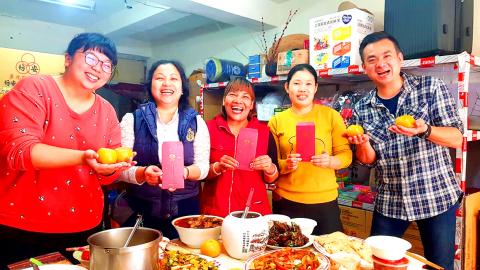Two social workers in Yunlin County yesterday invited three immigrant single parents to a traditional Lunar New Year’s eve banquet to help ease their homesickness.
Lin Li-na (林麗娜), who has a son in junior-high school, said that visiting her home country, Indonesia, was a luxury that she could not afford, as the airfare alone would cost about NT$50,000 (US$1,626).
Lin added that she dared not fly because she has asthma.

Photo: Liao Shu-ling, Taipei Times
Wu Mu-ni (吳木妮), another Indonesian, who was married to a Taiwanese who passed away two decades ago, said she has had a hard time raising her children alone and that returning home is almost impossible for her.
Kang Ching-jung (康菁容), who has two children, said she yearns to visit her home in Guiyang, China, to see her mother and sister, but she could not afford it.
After learning of their predicament, two social workers at the Taiwan Fund for Children and Families’ Yunlin branch — Wang Yao-ching (王耀慶) and Lee Hsin-wei (李欣薇) — invited the three to a weilu (圍爐) — a banquet for family members on Lunar New Year’s Eve.
It is a Taiwanese custom for families to have a get-together dinner on Lunar New Year’s Eve, when mothers usually prepare a lot of “auspicious” dishes, such as fish (yu, 魚), a homophone for surplus (yu, 餘).
Wang and Lee prepared traditional Taiwanese treats, such as niangao (年糕), fagao (發糕), radish cake (蘿蔔糕), “Buddha Jumps Over the Wall” (佛跳牆) and Murcott honey tangerines to wish their guests good fortune.
The single moms also prepared hometown dishes, such as Indonesian fried noodles, sweet and sour fish (糖醋魚) and mapo tofu (麻婆豆腐).
The women said they had fun sharing anecdotes with Wang and Lee, adding that they have not had such a heart-warming meal for a long time.

The manufacture of the remaining 28 M1A2T Abrams tanks Taiwan purchased from the US has recently been completed, and they are expected to be delivered within the next one to two months, a source said yesterday. The Ministry of National Defense is arranging cargo ships to transport the tanks to Taiwan as soon as possible, said the source, who is familiar with the matter. The estimated arrival time ranges from late this month to early next month, the source said. The 28 Abrams tanks make up the third and final batch of a total of 108 tanks, valued at about NT$40.5 billion

Two Taiwanese prosecutors were questioned by Chinese security personnel at their hotel during a trip to China’s Henan Province this month, the Mainland Affairs Council (MAC) said yesterday. The officers had personal information on the prosecutors, including “when they were assigned to their posts, their work locations and job titles,” MAC Deputy Minister and spokesman Liang Wen-chieh (梁文傑) said. On top of asking about their agencies and positions, the officers also questioned the prosecutors about the Cross-Strait Joint Crime-Fighting and Judicial Mutual Assistance Agreement, a pact that serves as the framework for Taiwan-China cooperation on combating crime and providing judicial assistance, Liang

A group from the Taiwanese Designers in Australia association yesterday represented Taiwan at the Midsumma Pride March in Melbourne. The march, held in the St. Kilda suburb, is the city’s largest LGBTQIA+ parade and the flagship event of the annual Midsumma Festival. It attracted more than 45,000 spectators who supported the 400 groups and 10,000 marchers that participated this year, the association said. Taiwanese Designers said they organized a team to march for Taiwan this year, joining politicians, government agencies, professionals and community organizations in showing support for LGBTQIA+ people and diverse communities. As the first country in Asia to legalize same-sex

MOTIVES QUESTIONED The PLA considers Xi’s policies toward Taiwan to be driven by personal considerations rather than military assessment, the Epoch Times reports Chinese President Xi Jinping’s (習近平) latest purge of the Chinese People’s Liberation Army (PLA) leadership might have been prompted by the military’s opposition to plans of invading Taiwan, the Epoch Times said. The Chinese military opposes waging war against Taiwan by a large consensus, putting it at odds with Xi’s vision, the Falun Gong-affiliated daily said in a report on Thursday, citing anonymous sources with insight into the PLA’s inner workings. The opposition is not the opinion of a few generals, but a widely shared view among the PLA cadre, the Epoch Times cited them as saying. “Chinese forces know full well that